The Dresselhaus Lecture series is named in honor of Mildred "Millie" Dresselhaus, a beloved MIT professor whose research helped unlock the mysteries of carbon, the most fundamental of organic elements—earning her the nickname “queen of carbon science.” This annual event recognizes a significant figure in science and engineering from anywhere in the world whose leadership and impact echo Millie’s life, accomplishments, and values.
2024 Mildred S. Dresselhaus Lecture:
Clare Grey, Cambridge University
Clare Grey, a Royal Society Research Professor and the Geoffrey Moorhouse-Gibson Professor of Chemistry at Cambridge University delivered the 2024 Mildred S. Dresselhaus Lecture on November 18, 2024.
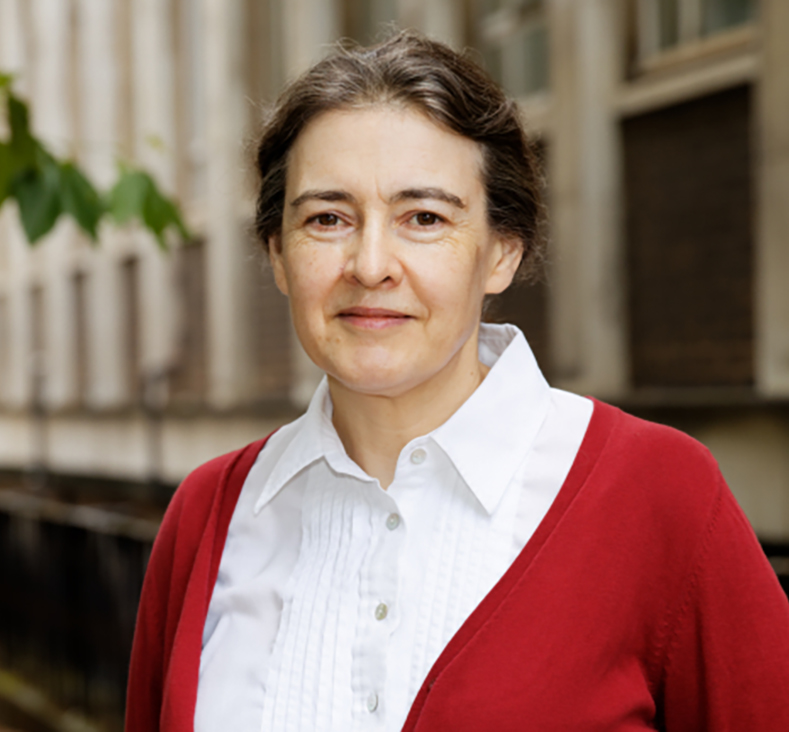 Clare Grey, DBE FRS
Clare Grey, DBE FRS
Understanding battery function: new metrologies, new chemistries, and new insights
Rechargeable batteries have been an integral part of the portable electronics revolution and are now playing a critical role in transport and grid applications to help mitigate climate change. However, these applications come with different sets of challenges. New technologies are being investigated and fundamental science is key to producing non-incremental advances and to developing new strategies for energy storage and conversion.
This talk focuses on the work of Dr. Grey's research group to develop NMR, MRI and new optical methods that allow devices to be probed while they are operating, from the local, to particle, and then cell level. This allows transformations of the various cell materials to be followed under realistic conditions without having to disassemble and take apart the cell.
Starting with local structure and dynamics, as measured by NMR, Grey then shows—with the optical methods—how the different dynamics can result in different intercalation mechanisms. A good example is her work on LiCoO2, where via optical approaches they were able to directly visualize movement of phase fronts as lithium is removed and inserted into this material.
Inspired by work of Prof. Millie Dresselhaus, Grey discusses her work on the application of electron spin resonance and dynamic nuclear polarization (DNP) NMR to graphitic anode materials and lithium metal batteries, to understand battery degradation. Finally, new results on extremely high-rate batteries are outlined and extensions of their new metrologies to study a wider range of electrochemical systems described.
Read a recap of Grey's lecture on MIT News.
Watch the video on MIT.nano's YouTube Channel.
About Clare Grey
Clare P. Grey, DBE, FRS is a Royal Society Research Professor and the Geoffrey Moorhouse-Gibson Professor of Chemistry at Cambridge University. After receiving a BA and D. Phil. from Oxford University, she was a postdoctoral researcher at Nijmegen and at DuPont CR&D. She joined the faculty at Stony Brook University (SBU) as an Assistant (1994), Associate (1997) and then Full Professor (2001-2015). She moved to Cambridge in 2009, maintaining an adjunct position at SBU.
Grey was director of the Northeastern Chemical Energy Storage Centre, a U.S. Department of Energy, Energy Frontier Research Centre, (2009-2010) and then associate director (2011-2014). She is currently director of the EPSRC Centre for Advanced Materials for Integrated Energy Systems (CAM-IES). She is co-founder of Nyobolt, a battery fast-charging company. Her current research interests include the use of solid-state NMR and diffraction-based methods to determine structure-function relationships in materials for energy storage, conversion, and carbon capture. Recent honors and awards include the Hughes Medal (2020), the Körber European Science Prize (2021), and the ACS Central Science Disruptors & Innovators Prize (2022).
2023 Mildred S. Dresselhaus Lecture:
Angela Belcher, MIT
Angela Belcher, the James Mason Crafts Professor of Biological Engineering, Materials Science and Engineering, and the Koch Institute for Integrative Cancer Research at MIT delivered the 2023 Mildred S. Dresselhaus Lecture on November 20, 2023.
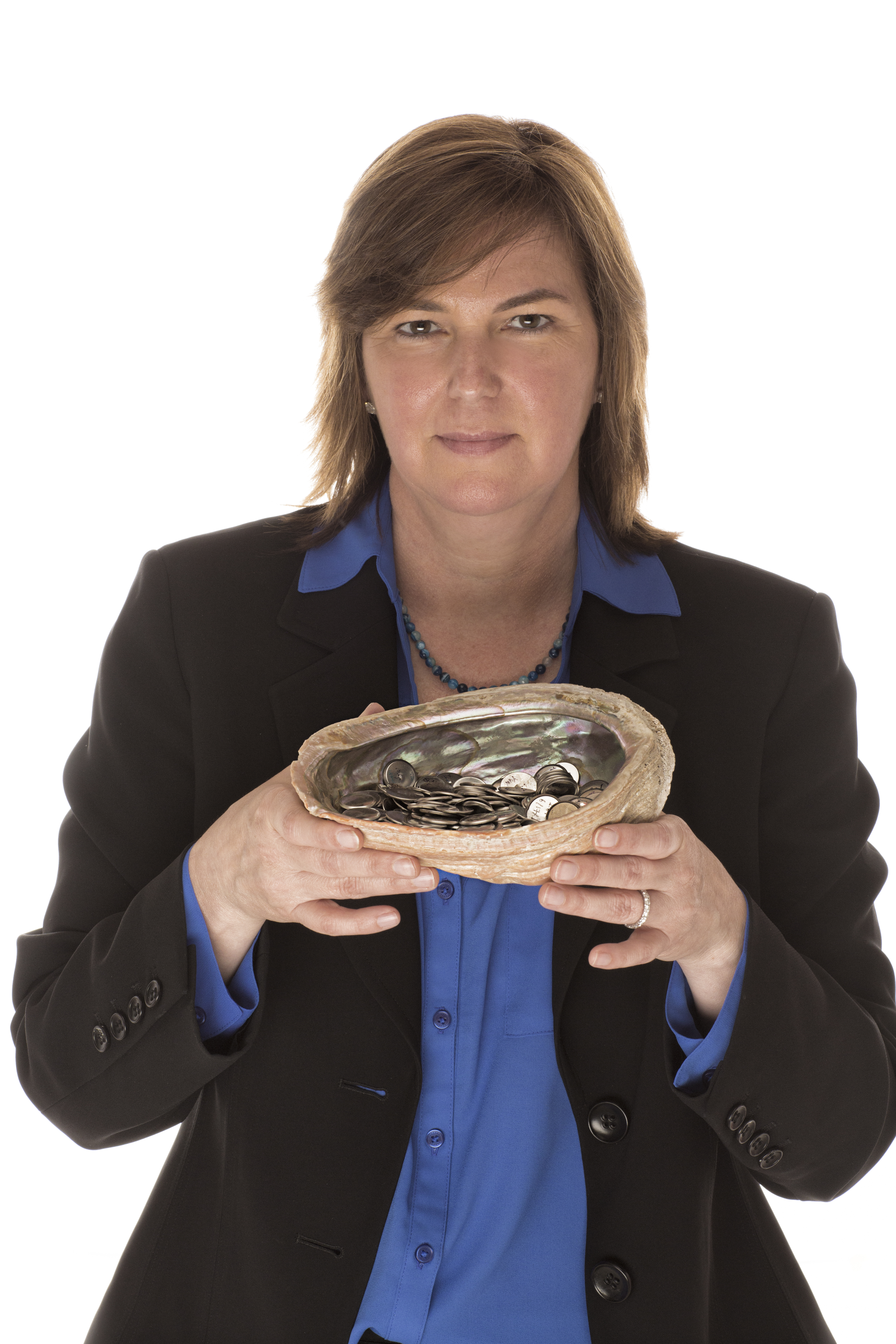 Angela Belcher
Angela Belcher
Evolving organisms to grow new nanomaterials for energy, the environment, and medicine
Organisms have been making exquisite inorganic materials for over 500 million years. Although these materials have many desired physical properties such as strength, regularity, and environmentally benign processing, the types of materials that organisms have evolved to work with are limited. However, there are many properties of living systems that could be potentially harnessed by researchers to make advanced technologies that are smarter, more adaptable, and synthesized to be compatible with the environment.
One approach to designing future technologies that have some of the properties that living organisms use so well is to evolve organisms to work with a more diverse set of building blocks. The goal is to have a DNA sequence that codes for the synthesis and assembly of any inorganic material or device.
We have been successful in using evolutionarily selected peptides to control physical properties of nanocrystals and subsequently use molecular recognition and self-assembly to design biological hybrid multidimensional materials. These materials could be designed to address many scientific and technological problems in electronics, environmental remediation, medicine, and energy applications. Currently we are using this technology to design new methods for building batteries, fuel cells, solar cells, carbon sequestration and storage, environmental remediation, catalysis, and medical diagnostics and imaging.
This talk addresses conditions under which organisms first evolved to make materials and scientific approaches to move beyond naturally evolved materials to genetically imprint advanced technologies with examples in lithium- and sodium-ion batteries, lithium-air batteries, environmental clean-up, and ovarian cancer imaging and treatment.
Read a recap of Belcher's lecture on MIT News.
Watch the video on MIT.nano's YouTube Channel.
About Angela Belcher
Angela Belcher is a biological and materials engineer with expertise in the fields of biomaterials, biomolecular materials, organic-inorganic interfaces, and solid-state chemistry and devices. Her primary research focus is evolving new materials for energy, electronics, the environment, and medicine.
Belcher received her B.S. in creative studies from The University of California, Santa Barbara (UCSB). She earned a Ph.D. in inorganic chemistry at UCSB. Following with her postdoctoral research in electrical engineering at UCSB. She now holds the James Mason Crafts Professor of Biological Engineering and Materials Engineering at MIT. She is faculty in the Department of Biological Engineering, Materials Science and Engineering, and the Koch Institute of Integrative Cancer Research. She teaches undergraduate subjects in material sciences and engineering and biological engineering.
In 2002, Belcher founded the company Cambrios Technologies, Inc., and in 2007 she founded Siluria Technologies, Inc. Some recent awards include the Lemelson-MIT Prize for her inventions, and Eni Prize for Renewable and Non-Conventional Energy. In 2009, Rolling Stone Magazine listed her as one of the top 100 people changing the country. In 2007, Time Magazine named her a “Hero” for her research related to climate change. She received the Four Star General Recognition Award (US Army) for significant contribution to army transformation. In 2000, she was awarded the Presidential Early Career Award in Science and Engineering (PECASE). She was named Research Leader of the Year by Scientific American, and is a MacArthur Fellow, a Packard Fellow, an Alfred P. Sloan Fellow, a Bose Fellow, a member of American Academy of Arts and Sciences, a member of the National Academy of Inventors, a member of the National Academy of Engineering and a member of the National Academy of Sciences.
2022 Mildred S. Dresselhaus Lecture:
Pablo Jarillo-Herrero, MIT
Pablo Jarillo-Herrero, the Cecil and Ida Green Professor of Physics at MIT, delivered the 2022 Mildred S. Dresselhaus Lecture on November 22, 2022.
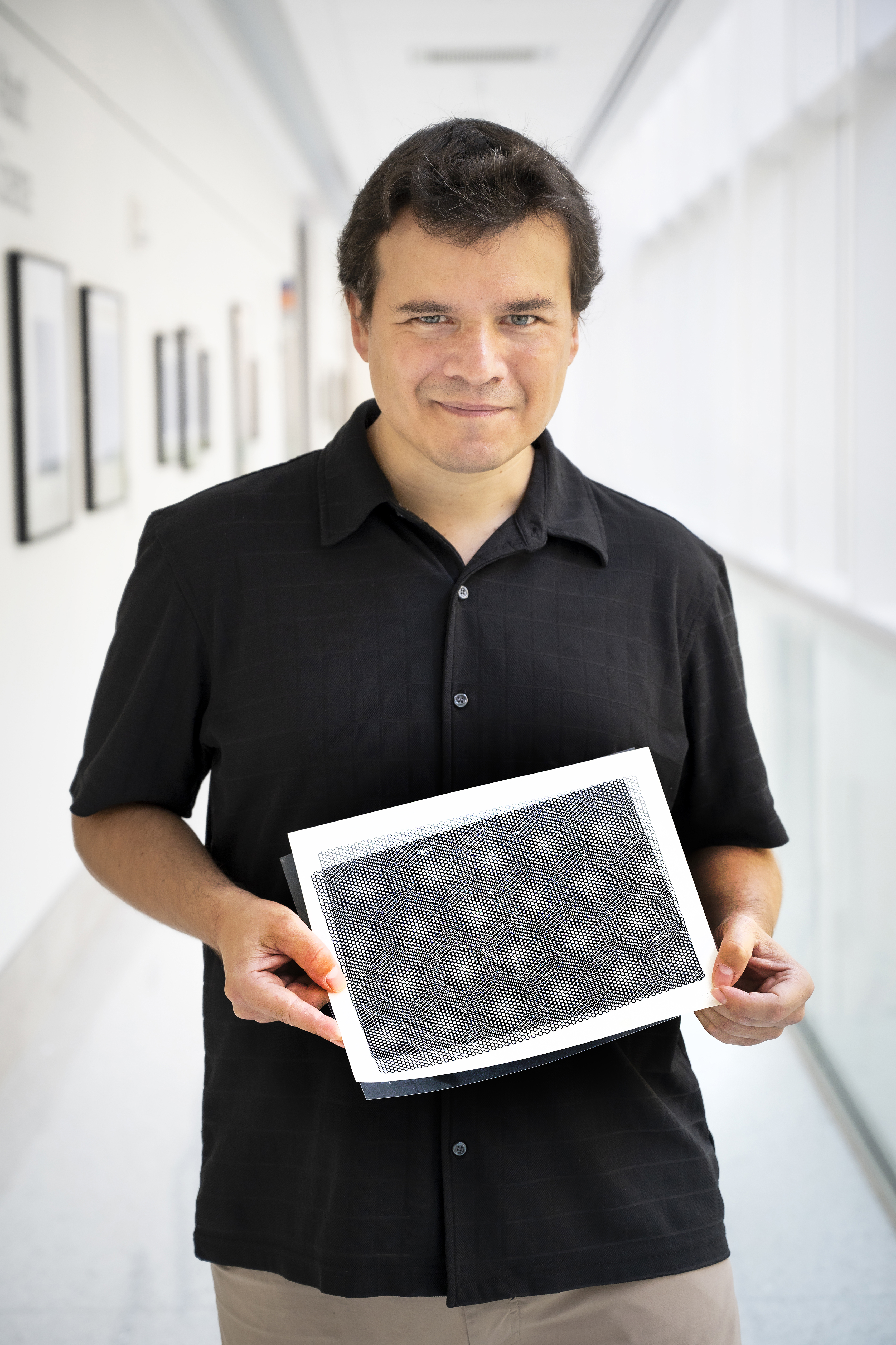
Pablo Jarillo-Herrero
The magic of moiré quantum matter
The understanding of strongly-interacting quantum matter has challenged physicists for decades. The discovery four years ago of correlated phases and superconductivity in magic angle twisted bilayer graphene has led to the emergence of a new materials platform to investigate strongly interacting physics, namely moiré quantum matter. These systems exhibit a plethora of quantum phases, such as correlated insulators, superconductivity, magnetism, ferroelectricity, and more.
In this talk, Jarillo-Herrero reviews some of the recent advances in the field, focusing on the newest generation of moiré quantum systems, where correlated physics, superconductivity, and other fascinating phases can be studied with unprecedented tunability. He concludes with an outlook of some exciting directions in this emerging field.
Read a recap of Jarillo-Herrero's lecture on MIT News.
Watch the video on MIT.nano's YouTube Channel.
About Pablo Jarillo-Herrero
Pablo Jarillo-Herrero is the Cecil and Ida Green Professor of Physics at MIT. He received his “Licenciatura” in physics from the University of Valencia, Spain, in 1999. Then he spent two years at the University of California in San Diego, where he received a M.Sc. degree before going to the Delft University of Technology in The Netherlands, where he earned his Ph.D. in 2005. After a one-year postdoc in Delft, he moved to Columbia University, where he worked as a NanoResearch Initiative Fellow. He joined MIT as an assistant professor of physics in January 2008 and received tenure in 2015. He was promoted to Full Professor of Physics in 2018.
Jarillo-Herrero's awards include the Spanish Royal Society Young Investigator Award (2006), an NSF Career Award (2008), an Alfred P. Sloan Fellowship (2009), a David and Lucile Packard Fellowship (2009), the IUPAP Young Scientist Prize in Semiconductor Physics (2010), a DOE Early Career Award (2011), a Presidential Early Career Award for Scientists and Engineers (PECASE, 2012), an ONR Young Investigator Award (2013), and a Moore Foundation Experimental Physics in Quantum Systems Investigator Award (2014). Prof. Jarillo-Herrero has been selected as a Highly Cited Researcher by Clarivate Analytics-Web of Science (2017-present), and was elected APS Fellow (2018), Fellow of the Quantum Materials Program of the Canadian Institute for Advanced Research (CIFAR, 2019), and Member at Large of the APS Division of Condensed Matter Physics (2019).
Jarillo-Herrero is the recipient of the APS 2020 Oliver E. Buckley Condensed Matter Physics Prize, the 2020 Wolf Prize in Physics, the 2020 Medal of the Spanish Royal Physics Society, the 2021 Lise Meitner Distinguished Lecture and Medal, the 2021 Max Planck Humboldt Research Award, and the 2021 US National Academy of Sciences Award for Scientific Discovery. He became elected to the US National Academy of Sciences in 2022.
2021 Mildred S. Dresselhaus Lecture:
Jelena Vučković, Stanford University
Jelena Vučković, the Jensen Huang Professor in Global Leadership in the School of Engineering; Professor of Electrical Engineering, and by courtesy of Applied Physics, at Stanford University, delivered the 2021 Mildred S. Dresselhaus Lecture on November 15, 2021.
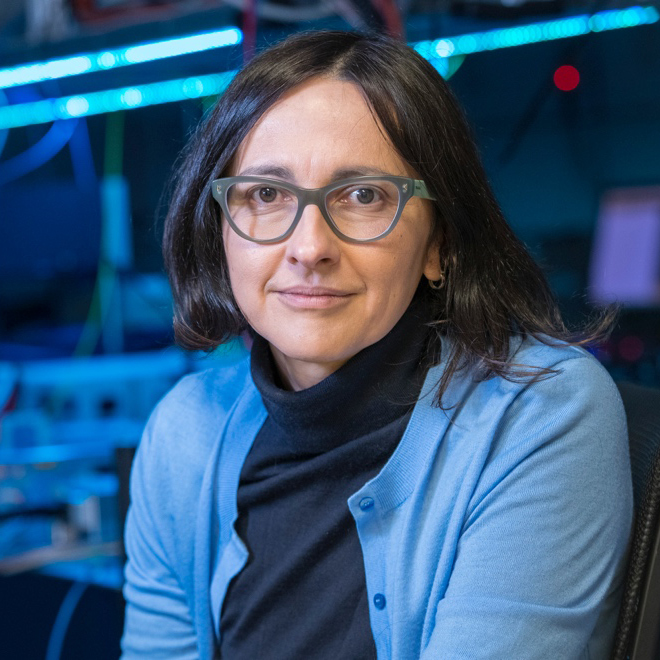
Jelena Vučković
Inverse designed photonics: Are computers better than humans in designing photonics?
Photonics are traditionally designed by combining building blocks from a limited library of known designs, and by manual tuning and tweaking of few parameters. Unfortunately, the resulting photonic circuits are very sensitive to errors in manufacturing and to environmental instabilities, bulky, and often inefficient.
In this lecture, Vučković shows how a departure from this old fashioned approach can lead to optimal photonic designs that are much better than state-of-the-art on many metrics (smaller, more efficient, more robust). This departure is enabled by development of an inverse design approach and computer software that designs photonic systems by searching through all possible combinations of realistic parameters and geometries.
Read a recap of Vučković's lecture on MIT News.
Watch the video on MIT.nano's YouTube Channel.
About Jelena Vučković
Jelena Vučković is the Jensen Huang Professor in Global Leadership in the School of Engineering, and Professor of Electrical Engineering and by courtesy of Applied Physics at Stanford, where she leads the Nanoscale and Quantum Photonics Lab. She is also the chair of the electrical engineering department at Stanford. She was the inaugural director of Q-FARM, the Stanford-SLAC Quantum Science and Engineering Initiative, and is affiliated with Ginzton Lab, PULSE Institute, SIMES Institute, Stanford Photonics Research Center (SPRC), SystemX Alliance, Bio-X, and Wu-Tsai Neurosciences Institute at Stanford.
2020 Mildred S. Dresselhaus Lecture:
Evelyn Hu, Harvard University
Evelyn Hu, the Tarr-Coyne Professor of Applied Physics and Electrical Engineering at the John A. Paulson School of Engineering and Applied Sciences at Harvard University, delivered the 2020 Mildred S. Dresselhaus Lecture on November 16, 2020.
Evelyn Hu
Transforming Defects into Opportunities: Leveraging the Nanoscale
In tribute to Millie’s contributions, this talk provides another narrative of how materials defects and insights at the nanoscale can be developed into transformative scientific opportunities. There has been recent excitement about the performance of defects (such as vacancies, or missing atoms) in crystalline semiconductors, where the defect, also termed qubit, can manifest optical emission at a variety of wavelengths, distinctively coupled to long spin coherence times. In particular, when defects such as Silicon Vacancies in 4H SiC are integrated within nanoscale optical cavities, there is the possibility for remarkable, controlled output of light from the defect. Moreover, the integrated defect-cavity system can serve as a “nanoscope” into the material, allowing us to learn about the interactions with surrounding defects, ultimately providing broader insights into longer-term quantum coherence.
Read a recap of Hu's lecture on MIT News.
Watch the video on MIT.nano's YouTube channel.
About Evelyn Hu
Evelyn Hu is the Tarr-Coyne Professor of Applied Physics and Electrical Engineering at the John A. Paulson School of Engineering and Applied Sciences at Harvard. She is presently a Co-Director of the Harvard Quantum Initiative. Prior to Harvard, she was a faculty member at UCSB, in the Departments of Materials, and of Electrical and Computer Engineering. While at UCSB, she also served as the founding Scientific co-Director of the California NanoSystems Institute, a joint initiative between UCSB and UCLA. Before joining UCSB, she worked at Bell Labs in both Holmdel and Murray Hill.
Hu is a member of the National Academy of Sciences, the National Academy of Engineering, the American Academy of Arts and Sciences, and the Academia Sinica of Taiwan. She is a recipient of an NSF Distinguished Teaching Fellow award, an AAAS Lifetime Mentor Award, the 2019 SES Eringen Medal, and the 2020 IEEE Grove Award. She holds honorary Doctorates from ETH Zurich, the University of Glasgow, Heriot-Watt University, Hong Kong University of Science and Technology, and the University of Notre Dame.
2019 Mildred S. Dresselhaus Lecture:
Paul McEuen, Cornell University
Paul McEuen, the John A. Newman Professor of Physical Science at Cornell University and director of the Kavli Institute at Cornell for Nanoscale Science, delivered the inaugural Mildred S. Dresselhaus Lecture at MIT on Nov. 13, 2019.
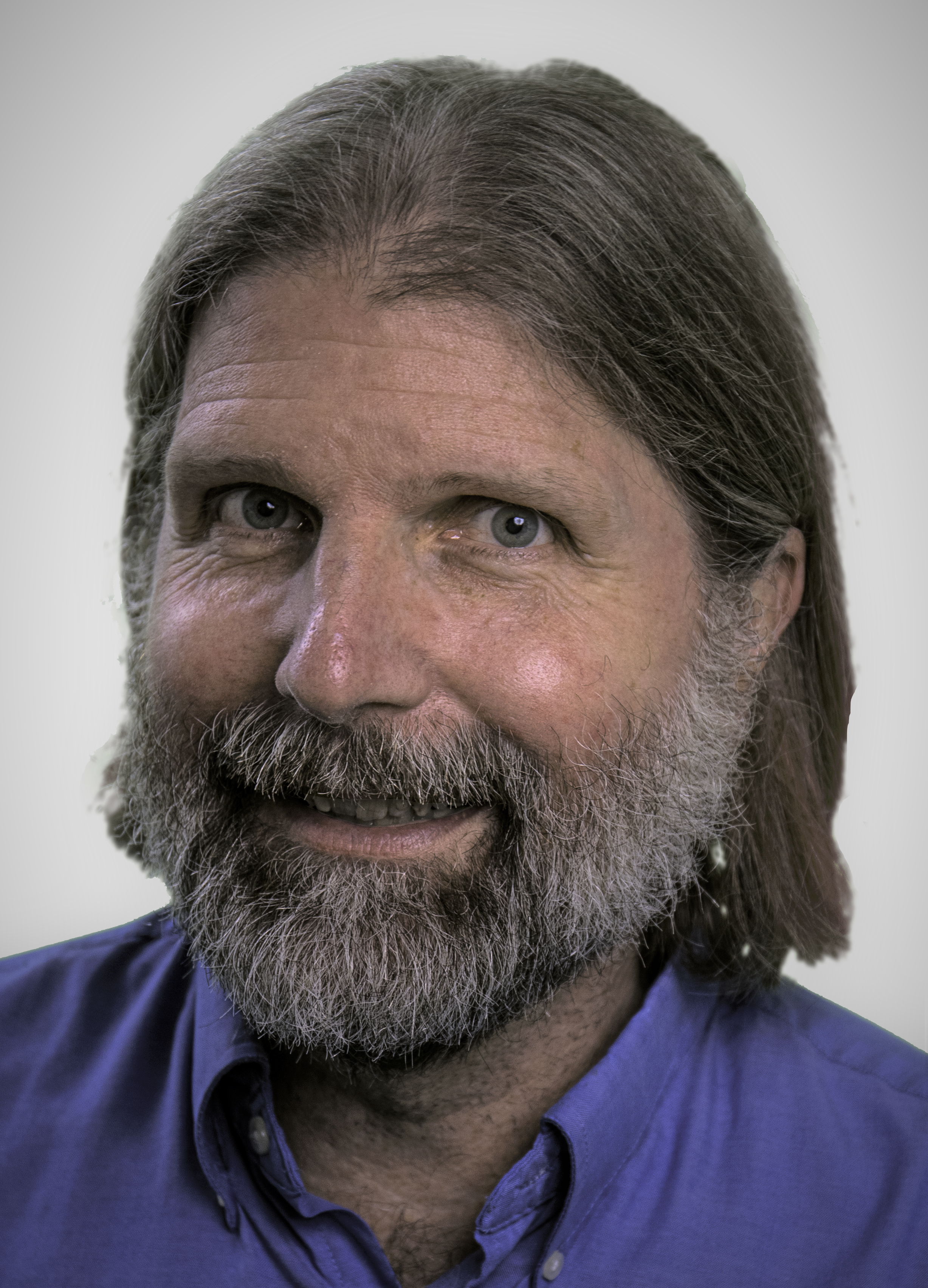
Paul McEuen
Cell-sized Sensors and Robots
"Fifty years ago, the Nobel Prize-winning physicist Richard Feynman claimed that a revolution was underway where information, computers, and machines would be shrunk to incredibly small dimensions. History has proven him mostly right: integrated circuits and Moore’s law have given us cell phones, the internet, and artificial intelligence. But the third leg of Feynman’s dream, the miniaturization of machines, is only just getting underway. Can we create functional, intelligent machines at the scale that biology does? The size of, say, a single-celled organism like a Paramecium? And if so, how? In this talk, I’ll take a look at some of the approaches being explored, focusing on a Cornell effort to combine microelectronics, optics, paper arts, and 2D materials to create a new generation of cell-sized smart, active sensors and microbots that are powered and communicate by light."
Read a recap of McEuen's lecture on MIT News.
Watch the video of McEuen's lecture.
About Paul McEuen
Paul McEuen is the John A. Newman Professor of Physical Science at Cornell University and Director of the Kavli institute at Cornell for Nanoscale Science. His research explores the electronic, optical, and mechanical properties of nanoscale materials; he is currently excited about using these materials to construct functional micron-scale machines. He is also a novelist, and his scientific thriller SPIRAL won the debut novel of the year from the International Thriller Writers Association. He is a fellow of the American Physical Society, the National Academy of Sciences, and the American Academy of Arts and Sciences.
